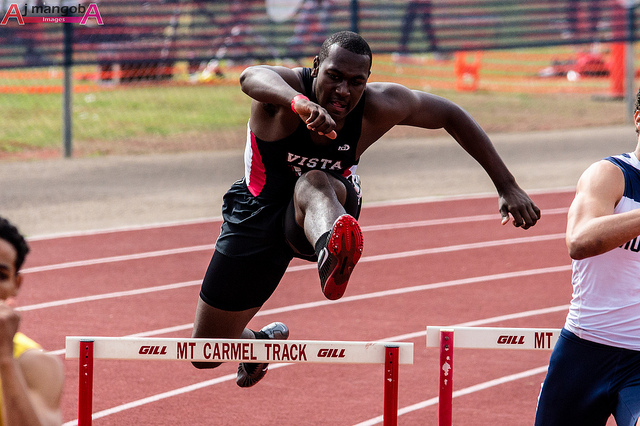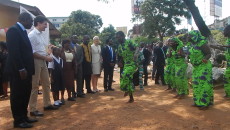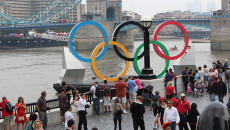When Philip Watson, Jr. speaks, he talks with a tinge of a Liberian accent. And his voice holds the same anguish as many Liberians who want to see an improvement in the image of their country and its people.
However, Watson has never seen Liberia. In fact, his Liberian-born parents left the country even before the civil crisis engulfed the nation.
This is one of the reasons Watson says he wants to run for Liberia. A senior sprinter at Eastern Mennonite University at the time of the interview, Watson has been trying to compete in the Olympics for Liberia since his sophomore year, in 2013. However, he has faced many difficulties.
Some of the challenges he has faced are similar to what his parents have cautioned him about the country. “At times, they’ll say the land is beautiful,†Watson said. “But when it comes to the government, it’s crooked.â€
Watson has been experiencing the ‘crooked’ nature of government bureaucracy described by his parents. Neither the Ministry of Youth and Sports or the “people in charge of athletics†seem to have a firm grip on the exact process for trying out for the Olympics team. Their website has mentioned nothing about trying out for the Olympics within the past year.
Very few people know what the exact process is. Even when he’s provided with the contact information for people who should be able to provide information, that contact usually leads nowhere.
“I called the embassy a while back, and they kept telling me about the former minister of youth and sports,†he said. The embassy provided what they said was Eugene Nagbe’s email address. Watson never received a response from Nagbe.
After trying through more professional means, Watson said, “I had to go through a classmate of mine’s father.†That friend’s father eventually put him in touch with former Olympian Kouty Mawenh who Watson said was “in charge of [the] athletic aspect of recruiting people for the Olympics.â€
Even after getting in touch with Mawenh, Watson complained that “they’re not being direct with me on exactly who they have and what they need. All they’re saying is if you run these times, then we’ll consider you.†Mawenh told him he had to run 10.33s in the 100-meter contest, but he would not say if others were competing.
But that answer doesn’t satisfy Watson. “What I want to figure out is if I run these times, am I guaranteed?â€
For him, all his efforts have been unproductive. “Dead ends here and dead ends there.â€
He did contact Phobay Kutu-Akoi via Facebook who ran for Liberia in the 2012 Olympics. That turned out to be fruitless, as she told him that the Liberian government had reached out directly to her.
One of the allure of sports is that it is expected to be a meritocracy where anyone who has the talent or ability can compete knowing that contestants will be judged solely on those attributes. Having to rely on personal connections or chance discoveries by agents upends that premise. Worse, for Liberian athletes in unpopular sports, it would be impossible to be noticed as these agents are likely only looking at popular sports categories like athletics.
In the United States, athletes hoping to represent their country can participate in the U.S. Olympic Trials, where over 1,000 athletes compete against each other for a spot on the Olympic team. Information about the trials are posted online, and athletes can register to compete.
A Forbes article tallied that in the past seven Olympic races, all the finalists for the men’s 100-meter races were of West African descent. Despite Liberia being in a region from where a majority of world class sprinters hail, the country has not fielded a 100m or 200m male competitor since it sent Sayon Cooper in 2000. Instead, Liberia has sent representatives in farfetched fields such as judo, as it did in 2012 with Liva Saryee, who ended up not even competing because he did not know the rules of judo.
The minister for youth and sports, Saah N’Tow, who had just taken over his post when interviewed, said the Liberia National Olympic Committee has agents in countries of high Liberian concentration to select individuals to invite for trials.
Regarding the lack of information on the ministry’s website, he said, “we’re still building the skillset to maintain an active website.†He said the ministry is working on improving the website with information that people have demonstrated the need for, adding, “we’re working on all of those things, but we’re not yet there.â€
As for Watson, N’Tow said, “I don’t know him, [but] quite frankly, I have the same questions he has. When I was out in Rhode Island, we had all these great young athletes.â€
“I thought they could run for Liberia, but there are several things that come in between them running for the country while living in another country,†he said. “One of my goals is to see that we make it easy for anyone who qualifies, especially those ones who are privy to these wonderful facilities [in other countries] – anyone who can make it, that we can make it easy for them. So I’m working with the committee here to see how we can make that happen. Is that going to happen this year? I’m not sure. Maybe next year.â€
For 2015-2016, the fiscal year before the 2016 Olympics, the Liberian government only allocated US$10,000 to the Liberia National Olympic Committee, while US$15,000 was provided for the Inter-Ministerial League, an amateur competition where government officials compete against each other. The Olympics, in general, seems to be a low priority for the government, judging by the funds the committee receives. The Liberian Chess Federation alone receives double the amount allocated to LNOC.
The LNOC is also one of the 206 national Olympic committees that get a share of money provided by the International Olympic Committee, although the precise amount is unclear. Philibert Browne, the chair of the LNOC, did not respond to calls for an interview.
Featured photo by AJ Mangoba. Editor’s note: A previous version of this article incorrectly attributed a comment about Liva Saryee to Madeah Addy. The quote was from another person and has been removed.



